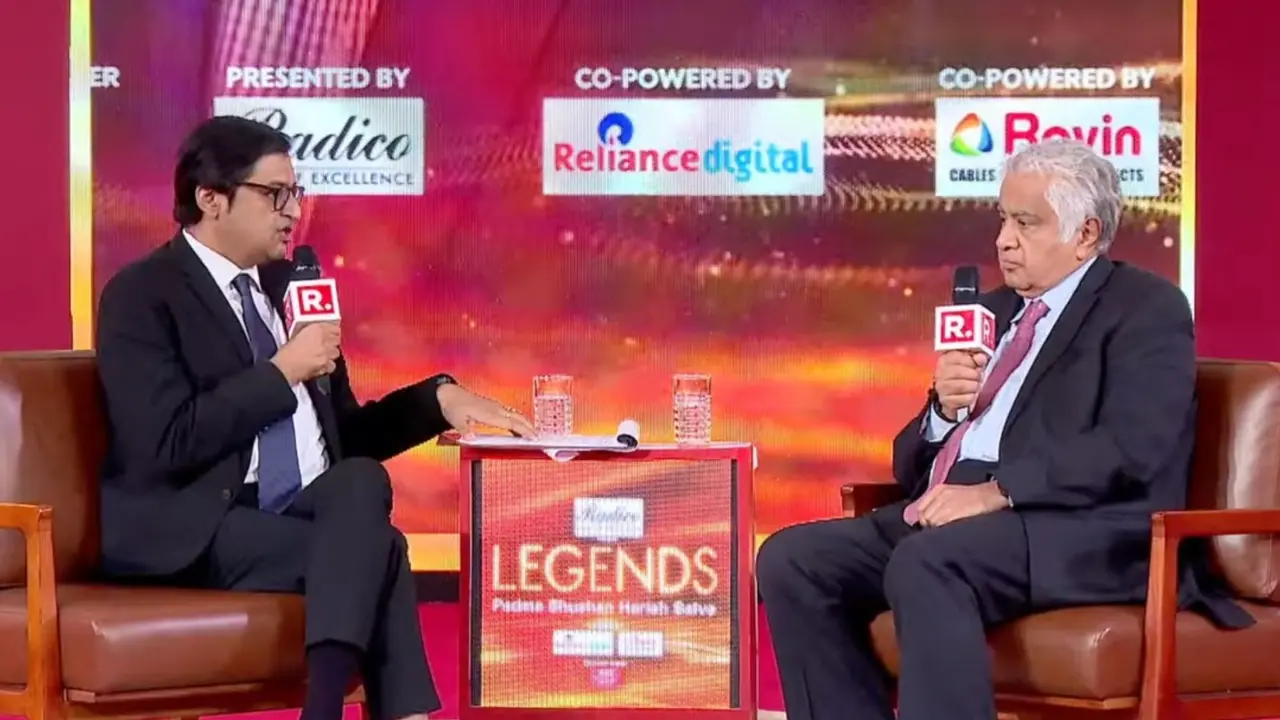When the news broke that a Delhi High Court judge’s residence had turned into a vault of burnt currency, India didn’t just see a fire—it saw the moral decay of an institution once revered as the last bastion of integrity. Instead of ordering a police investigation, the Chief Justice of India chose an “internal inquiry”. That one phrase summed up everything wrong with India’s higher judiciary today: a reflex to protect its own, no matter the rot within.
The judiciary’s credibility is collapsing—not gradually, but in free fall. And at a time when public faith is being charred along with unaccounted cash, Harish Salve’s explosive interview with Republic TV Editor-in-Chief Arnab Goswami came as a long-overdue mirror to India’s courts.
In an unflinching two-hour conversation, Salve—India’s most respected international advocate—ripped through the institutional arrogance, misplaced activism, and moral drift of the Indian judiciary. His words were not meant to please; they were meant to sting. And they did.
Salve reminded that the courts are meant to interpret the law, not govern the country. Yet, in recent years, India’s Supreme Court and several High Courts have behaved as though they are superior to both Parliament and the Executive—issuing orders on everything from firecracker bans and temple rituals to government appointments and economic policy.
“The Constitution doesn’t give the judiciary a license to run the country,” Salve declared, dismantling the new-age cult of judicial overreach that masquerades as “activism.” When unelected judges start dictating how an elected government should function, democracy loses its balance. India is now dangerously close to that point.
Salve’s frustration stems from memory—from a time when the judiciary produced giants like Justice H.R. Khanna, who upheld liberty during the Emergency at personal cost, and intellectual titans like Nani Palkhivala, whose words inspired reverence, not ridicule.

Today, that moral clarity has been replaced by self-importance. Some judges, drunk on media applause, behave like social philosophers. Others, upon retirement, rush to television studios or foreign outlets like the BBC, confessing their “mistakes” as if seeking moral redemption through publicity. “These confessions don’t cleanse the system,” Salve warned, “they expose its hypocrisy.”
The very judges who once thundered from the bench about transparency now retreat behind the shield of “internal processes” when their own come under scrutiny. The Delhi High Court currency-burning incident wasn’t just criminal—it was symbolic. The fire that burned those notes also singed the remaining shreds of judicial sanctity.
From his home in London, Salve speaks as a global jurist and a proud Indian. Unlike fugitives who use the UK as a hideout, he uses his global stature to defend India’s reputation abroad. In his interview, he rejected the Western narrative that India’s democracy is in decline, calling it a “concerted misinformation campaign by the Western deep state and their Indian echo chambers.”
He praised the Modi government’s decisive leadership for transforming India’s global standing, while cautioning that the judiciary must not become the weak link in this story of resurgence. “You cannot have a nation rising on economic and diplomatic fronts while its justice system crumbles under ego and inertia,” he said pointedly.
The real tragedy is not just corruption—it is the loss of purpose. Judges were once seen as the conscience of the Republic. Today, they are seen as a closed fraternity—untouchable, unaccountable, and increasingly out of touch with the India they claim to serve.
Courtrooms, once sanctuaries of justice, have become echo chambers of privilege. Cases drag for decades, judgments read like lectures, and ordinary citizens wait lifetimes for closure—while the powerful secure “urgent listings” at midnight.
This selective morality is the cancer eating away at the judiciary’s legitimacy. And no internal inquiry, no pious speech at a law seminar, can cure it.
Harish Salve’s words should shake the conscience of every judge who still believes in the idea of India. His message was simple: the judiciary is not above the Republic—it exists because of it. The Constitution gave our judges enormous privileges, security, and independence not to indulge in self-importance, but to serve with humility and courage.
It’s time the Lordships of our Supreme Court and High Courts pull up their socks. The robes they wear are not shields of entitlement—they are symbols of national duty. The country takes care of their salaries, security, pensions, and privileges. The least they can offer in return is integrity, not indulgence.
The judiciary must remember—it is not the guardian of its own comfort, but of India’s conscience. If it continues to hide behind “internal mechanisms” and elite self-protection, it risks becoming what the public already fears it is becoming: a private club masquerading as a temple of justice.
India deserves better. And the time for judicial introspection is not tomorrow. It is now.





